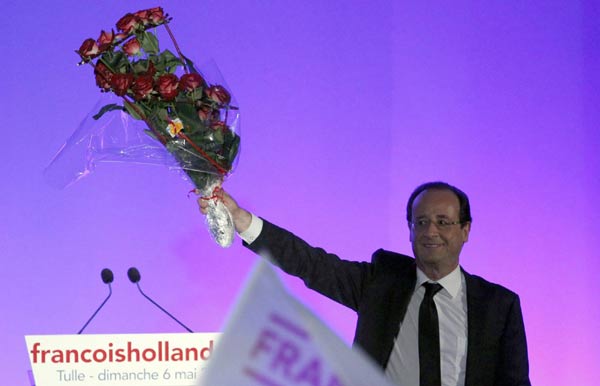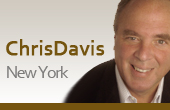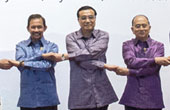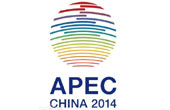Hollande ousts Sarkozy as French leader
(Agencies) Updated: 2012-05-07 07:42
 |
|
France's newly-elected President Francois Hollande holds a red roses bouquet as he celebrates on stage after results in the second round vote of the 2012 French presidential elections in Tulle May 6, 2012. [Photo/Agencies] |
Hollande led conservative incumbent Nicolas Sarkozy by 51.3 percent to 48.7 percent with 83 percent of votes counted, the Interior Ministry said, bringing the centre-left back to government in Paris after a decade in opposition.
"Europe is watching us," the president-elect said in a victory speech in his constituency of Tulle in central France. "I'm sure that in many European countries there is relief and hope at the idea that austerity does not have to be our only fate."
Sarkozy, punished for his failure to rein in 10-percent unemployment and for his brash personal style, was the 11th euro zone leader in succession to be swept from power since the currency bloc's debt crisis began in 2009.
The outgoing president conceded defeat within 20 minutes of polls closing, telling supporters he had telephoned Hollande to wish him good luck in such trying times.
"I bear the full responsibility for this defeat," Sarkozy said, indicating he would withdraw from frontline politics.
"My place can no longer be the same. My involvement in the life of my country will be different from now on."
Jubilant Hollande supporters celebrated outside Socialist Party headquarters and thronged Paris' Bastille square, where revelers danced the night away in 1981 when Francois Mitterrand became the only previous directly elected Socialist president. Many waved red flags and some carried roses, the party emblem.
But the rejoicing may be short-lived after a political bombshell in Greece, where mainstream parties were hammered in a parliamentary election that seemed set to leave supporters of an IMF/EU bailout without a majority, raising doubts about Athens' future in the euro zone.
Hollande's clear win should give the self-styled "Mr Normal" the momentum to press German Chancellor Angela Merkel to accept a policy shift towards fostering growth in Europe to balance the austerity that has fuelled anger across southern Europe.
Merkel, who had openly favored fellow conservative Sarkozy, telephoned to congratulate Hollande and invited him to visit Berlin as soon as possible after his inauguration next week. The vote put an end to the "Merkozy" duo which had led Europe through crisis and ushers in a new, untested partnership.
German Foreign Minister Guido Westerwelle, speaking at French embassy event, said: "We will now work together on a growth pact for Europe, that delivers more growth through more competitiveness."
An opinion poll taken on Sunday showed the left strongly placed to win a majority in parliamentary elections next month, especially since the anti-immigration National Front is set to split the right-wing vote and hurt Sarkozy's UMP party.
If they win that two-round election on June 10 and 17, the Socialists would hold more levers of power than ever before, with the presidency, both houses of parliament, nearly all regions, and two-thirds of French towns in their hands.
Bastille stormed again
In Bastille square, flashpoint of the 1789 French Revolution and the left's traditional rallying point for protests, activists began partying before the final polls closed and cheered as giant TV screens relayed the result.
Hollande, a mild-mannered career politician, led the race from start to finish, outlining a comprehensive program in January based on raising taxes, especially on high earners, to finance spending priorities and keep the public deficit capped. He has vowed to balance France's budget by 2017, but economists say he is likely to have to make public spending cuts soon.
As much as his own program, Hollande benefited from an anti-Sarkozy mood due to the incumbent's abrasive personal style and to anger about the same economic gloom that has swept aside leaders from Dublin to Lisbon and Athens.
"I don't know if Hollande will do any better on the economy than Sarkozy, but I want a president who knows the value of justice and sharing," said Maxime Vissac, 27, a trainee teacher in Paris.
Sarkozy launched his campaign late and swerved hard to the right between the two rounds of voting as he tried to win back low-income voters who ditched him for the radical left and the far right on the first ballot.
His aggressive rallies and promises to reduce the number of immigrants, crack down on Islamist fundamentalists and tax exiles and to make the unemployed retrain to get benefits barely dented Hollande's lead. Sarkozy also failed to land a knockout punch in their only television debate, last week.
In two further blows in the last days of the race, far-right leader Marine Le Pen, who won 17.9 percent in the first round, and centrist Francois Bayrou, who polled 9.1 percent, refused to endorse the conservative president.
Le Pen, who campaigned on a platform of leaving the euro and restoring trade barriers, vowed to lead "a real opposition that is ideologically distinct", predicting that Sarkozy's UMP party would implode by the time France votes again in five weeks.
Hard leftist Jean-Luc Melenchon, who polled 11 percent on the first round before throwing his support behind Hollande, crowed: "Sarkozy is finished at last. The gravedigger of welfare rights and public services has got his just deserts."
No tsunami
Sarkozy allies consoled themselves that the margin of defeat could have been worse, preserving their parliamentary election hopes. "People were talking about an anti-Sarkozy tsunami," Foreign Minister Alain Juppe said. "That's not what happened."
The election comes at a crucial time for the euro zone as France, Europe's No. 2 economy, is a vital partner for Berlin.
Hollande, 57, joins a minority of left-wingers in government in Europe and has vowed to renegotiate a budget discipline treaty signed by 25 EU leaders in March, to add growth measures. Berlin made the pact a condition of aid for struggling states.
Italy's technocratic prime minister Mario Monti was also on the telephone to Hollande on Sunday, agreeing, Monti's office said, on the need to coordinate EU policies to promote growth.
Unlike Mitterrand in 1981, the moderate president-elect has no plans to nationalize swathes of industry or launch a deficit spending spree, and the prospect of his victory has caused no great alarm in financial markets or European chanceries.
Merkel herself spent an uncomfortable evening as her Christian Democrats looked likely to lose further local power after a state election in Schleswig-Holstein, continuing a pattern that may erode her chances of a third term next year.
While financial markets are warming to Hollande's growth agenda, analysts say he will need to reassure investors quickly as fears resurface over the euro zone's debt woes.
In his victory speech, he listed reducing the deficit to control public debt among his priorities along with "reorienting Europe towards employment and growth for the future".
France is grappling with feeble growth and unemployment at its highest since 1999, a gaping trade deficit and high state spending that is straining public finances and was a factor in Standard & Poor's downgrading its triple-A credit rating.
French 10-year bond yields fell to 2.87 percent on Friday, a level not seen since early October. Yet French debt could remain vulnerable to selling pressure, as markets and credit rating agencies wait to be convinced of his fiscal credentials.
Economists want Hollande to trim over-optimistic growth forecasts and impose spending cuts, but political analysts say this could be difficult with left-wing voters hoping he will raise the minimum wage and reverse a recent sales-tax rise.
Little known outside France, Hollande will soon have his diplomatic skills tested at a Chicago NATO summit in late May and a Group of 20 summit in Mexico in late June. The former Socialist Party chief has never held a ministerial post.
As jubilant Socialists danced in the streets, one man was left to rue a moment of madness in a New York hotel. Former IMF chief Dominique Strauss-Kahn was on course to be his party's candidate to run against Sarkozy until he was arrested a year ago for the alleged attempted rape of a hotel maid.
Strauss-Kahn's fleeting appearance at a Socialist lawmaker's birthday party in a former sex shop last week caused Hollande more embarrassment than any other incident during the campaign.










